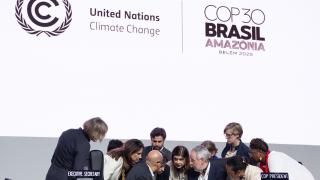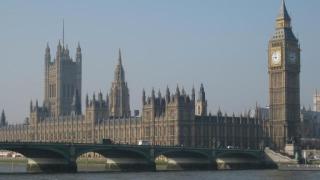Brexit makes a foreign policy overhaul inevitable — base it on principled cooperation or face a diplomatic wilderness
This blog by Ben Donaldson, Head of Campaigns, was originally published by Medium on 15 March 2018.
Recent weeks and months have seen a deluge of parliamentary inquiries on Britain’s role in the world. Several have focussed on the question of British influence — specifically whether a string of diplomatic setbacks last year signal a decline.
In November, the UK allowed an ignominious standoff with India to manifest over whose candidate would get appointed as a judge to the International Court of Justice. The UK lost — for the first time in 70 years. In June, it was unable to muster the support of EU allies in a General Assembly vote on the Chagos Islands. Throughout the year, the UK suffered criticism for snubbing over 130 states that negotiated a nuclear-ban treaty. While France, Russia and the US also stayed away from talks, it was China — not the UK — that nearly broke ranks to bridge the divide between the declared nuclear-armed states and the rest, a role that one might have expected the UK to play.
Perhaps most damaging, have been repeated questions levelled at the UK about its support — politically and in the form of almost £5bn in arms — to the Saudis who are leading an intervention in Yemen that has resulted in the world’s largest humanitarian crisis. High-profile voices have called for the UK to step down as the Council ‘lead’ on Yemen. There is talk in New York that post-Brexit, with France holding the de facto EU seat on the Security Council, the UK may end up being side-lined and put under pressure to make concessions, including on Council reform.
But this is only part of the story. The wider UN membership is increasingly challenging the permanent members (P5) of the Security Council, pointing to a host of situations — from Syria to Yemen to Ukraine — where they are not just failing to produce solutions but actually making things worse.
While the Council has often been dysfunctional, throughout most of the UN’s history, there has been at least one permanent member willing and capable of providing leadership on the key challenges facing the world. At present the leadership deficit is severe and the associated hypocrisy is encouraging other states to ride roughshod over their own international obligations.
In this new reality the UK cannot rely on traditional ways of working. It must accept that while it has been focussed on matters closer to home, the world around it has changed.
For much of the last century, the international system has insulated the West from crises. Now that the system is under severe strain we can see the impacts on our doorstep (in the form of refugees for instance). As a country whose security, prosperity and standing has been protected by the UN, the UK stands to lose much if this system breaks down.
There is also a risk that while Security Council reform is unlikely to happen any time soon — it would require, in any case, UK agreement — the UK could be seen as an increasingly ineffectual or illegitimate “occupier” of its permanent seat, on a Council that is itself seen as widely discredited.
This prospect is real and ministers should be troubled by it, even those that view ‘Global Britain’ in narrow trade terms, as it would have consequences for our bilateral relationships across the board. To avoid this scenario, the Government needs to change tack.
For many decades, the UK has positioned itself in relation to others — as the ‘outlier’ in Europe, the force behind the Commonwealth or the best friend of the United States. Unless current contexts change dramatically, these routes are unlikely to be fruitful or compatible in the future.
Instead, the UK should position itself as a country that matters because of what it does — through its contributions to international development, diplomacy and peacekeeping, for instance.
The UK is not the only country that likes to think it punches above its weight. States such as Sweden, Canada, and Liechtenstein, have outsize influence at the UN because of their positioning as feminist or humanitarian powers, or because of the hard work they put into UN business. These efforts not only shore up their power but help to strengthen the international system on which we all depend.
The UK could seek to fill a similar role, using its position on the Security Council as a champion of universal values and a voice for the wider UN membership and global public at large. We have some form in this regard, from galvanising support for the Arms Trade Treaty to opening up the recruitment process for the UN’s chief.
But to be successful, the UK needs a foreign policy that is principled, multilateral and consistent. It cannot lead on aid whilst at the same time undermining these efforts through arms sales. It cannot campaign for stronger UN human rights mechanisms and then belittle them in the face of criticism.
A couple of years ago, proposing such a transformation would have been fanciful. Today, overhaul is inevitable. Britain’s position has changed and so has the world around it. The UK must desist from cherry-picking its favourite bits of multilateralism and start supporting the system as a whole. If it doesn’t, then diplomatic obscurity could soon displace aspirations of a ‘Global Britain’.






